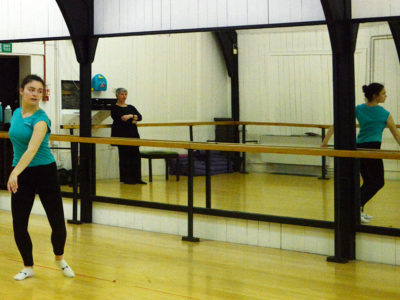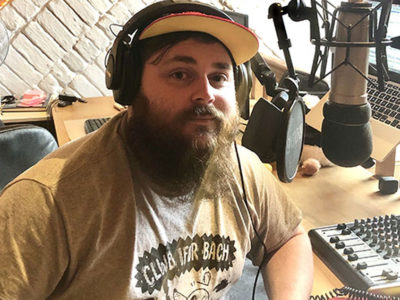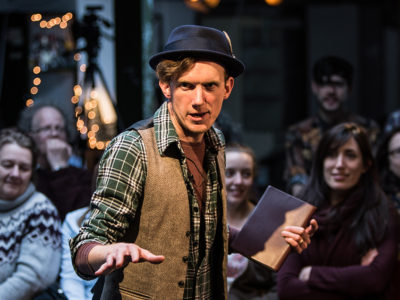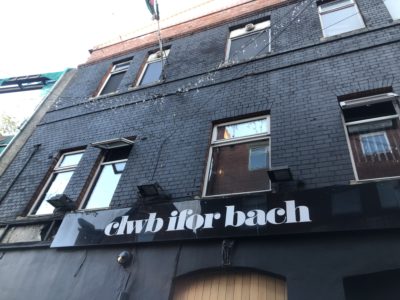The “Game-Changer”
The Arts Council of Wales works with many individuals and organisations, with the resources at their fingertips to promote both traditional and contemporary Welsh music. One such man is John Rostron; co-founder of Sŵn festival, the Welsh Music Prize and ex-chief executive of the Welsh Music Foundation.
The ACW was forced to pull support from the Welsh Music Foundation due to cuts in government arts spending; Rostron, the chief executive of the organisation declared this was “extremely disappointing and frustrating.”
“We know that we were important as the intermediary between music businesses and the government. We had just delivered WOMEX which was a real game changer.”
The Welsh Music Prize 2014
There seems to be a constant stream of high quality musical talent coming through Wales, Rostron enthused. Hence, The Welsh Music Prize came into being because, as Rostron said, “I knew there’s a lot of talent out there and thought it didn’t have enough platforms to reach people or to really celebrate and make the most of it.”
This year, the accolade was awarded to Cardiff-based noise-pop five-piece, Joanna Gruesome. The panel of expert judges – which included esteemed music critics, producers and promoters – deemed that Joanna Gruesome’s album Weird Sister reigned victorious over the other 11 entries.
You can listen to two of the tracks from the album via this Soundcloud sampler:
Just weeks after the Welsh Music Prize 2014 announced its winner, alt.Cardiff asks is contemporary Welsh music funding stuck in the past?
Super Furry Animals. High Contrast. Funeral For a Friend. Duffy. An incredibly diverse list of musical talent you wouldn’t group together? In fact, they all have one thing in common. They all hail from Wales.
Undoubtedly, this country has seen a multitude of musicians enter the limelight, over the years, from global superstars like Tom Jones and Shirley Bassey, to British cult icons like the Manic Street Preachers.
However, some say not enough is being done to cultivate and nourish young artists in the Welsh arena. In fact, over the past few years this backward-looking movement has reversed and there is a much greater emphasis in the music sphere on contemporary artists. Lleucu Siencyn, chief executive of Literature Wales, at an Index On Censorship Free Speech Hearing on 27 November said, “If we loosen up and connect ourselves with the world through the next generation, that’s where we will eventually enable the real grassroots, true side of arts engagement.”
Is history being repeated?
It has been suggested by a consultant for the Arts Council of Wales (ACW) that the problem lies in prioritising the past, rather than the future of the arts in Wales. Richard Higlett said, “The relationship between Wales and discovery of itself and its identity means that primarily, heritage has been the focus of funding.”
He believes that, while heritage is important, some Welsh artists want to define themselves in the present and identify with contemporary context. While the focus of funding is on heritage, this is difficult. It could also stunt progression. Higlett added, “Heritage is there, it doesn’t move; heritage doesn’t necessarily evolve. Contemporary practise is a statement in the now.”
Here’s to looking forward
When asked about the apparent focus of funding on heritage, John Rostron, known for initiating Sŵn festival, said, “That was true, historically, but is less true now.” He held Cate Le Bon and the Samoans up as examples of artists who benefitted directly from the Music Industry Development fund, saying “They’re the kind of artists that very likely wouldn’t have been supported by the arts council before.”
The Music industry Development programme is the ACW’s specialist contemporary music fund. They are also funding partners in Horizons with the BBC, supporting 12 acts a year, out of a total 112 applicants.
Among these is Gabrielle Murphy – just 17 years old – from Treherbert in the Rhondda Valleys. The youngster certainly stands out in the crowd, for all the right reasons. Her voice is matched only by her outstanding style and poise.
Gabrielle expressed her immense gratitude to Horizon for allowing her to further her career and fulfil her potential, even recording at Maida Vale studios, adding her name to a list of recording artists including Jimi Hendrix and The Beatles. The songstress almost seemed giddy when she told us, “I got to use the microphone used by Beyonce… Wow.”
She is waiting to hear whether she has gained further from the Launchpad, that awards 25 grants worth £2000 to young musicians. “This funding will make it possible for me to produce my second EP next year. I have my fingers, toes and everything else crossed,” Gabrielle enthused, adding, “Wish me luck!”
More established musicians like 9Bach also feel nurtured and supported by private organisations, according to the band’s front-woman, Lisa Jen. Despite this, Jen alleged – during an ArtFreedomWales online hangout – that there are problems with the complex language of music grant applications: She said that without an extensive understanding of the applications you’d have no chance of applying successfully.
However, Lisa Matthews, the portfolio manager at the ACW, confirmed that evidence from all artists applying for grants is needed because it is ultimately, public money being spent. She defended the application process, saying that with this Launchpad fund, “We target new musicians through the BBC and also create a scheme that offers smaller funding amounts so we can simplify the application process.”
Watch Gaby’s debut music video, Bad, here:
The future sounds bright
So the Arts Council of Wales is clearly taking steps in the right direction, towards the future of Welsh music.
Indeed, this has been another great year for established Welsh music. Under John Rostron and his co-founder, Radio 1 DJ Huw Stephens, the Welsh Music Prize has once again returned to warm the winter evenings, promoting singles from home-grown Welsh talents.
But what of those musicians who never get recognition due to lack of funding? Perhaps, the problem simply lies in the fact that, regardless of where the music funding in Wales is allocated – whether in past, present or future – there is not enough to go around.
Only 0.23% of the Welsh budget is spent on the arts, and even less on music specifically. In a recent interview with Wales Online, Stereophonics frontman Kelly Jones, recently spoke out against the cuts, saying the public-service cuts are devastating. When you consider how beneficial music – and the arts in general – can be to all sectors of society, surely herein lies the real problem.
Rostron agreed that, in terms of the arts sectors in Wales, things happen despite lack of funding and support. Creative people will always create. He added, “It’s not always about someone giving you investment, it’s about Cardiff providing the right infrastructure for your creative endeavour.”
With a higher public regard for this nation’s music and the efforts of individuals like Lisa Matthews and John Rostron, the future will surely see names like Gabrielle Murphy, 9Bach and Joanna Gruesome reach the heights of critical acclaim that their forerunning Welsh musical icons enjoy.
The “Game-Changer”
The Arts Council of Wales works with many individuals and organisations, with the resources at their fingertips to promote both traditional and contemporary Welsh music. One such man is John Rostron; co-founder of Sŵn festival, the Welsh Music Prize and ex-chief executive of the Welsh Music Foundation.
The ACW was forced to pull support from the Welsh Music Foundation due to cuts in government arts spending; Rostron, the chief executive of the organisation declared this was “extremely disappointing and frustrating.”
“We know that we were important as the intermediary between music businesses and the government. We had just delivered WOMEX which was a real game changer.”
The Welsh Music Prize 2014
There seems to be a constant stream of high quality musical talent coming through Wales, Rostron enthused. Hence, The Welsh Music Prize came into being because, as Rostron said, “I knew there’s a lot of talent out there and thought it didn’t have enough platforms to reach people or to really celebrate and make the most of it.”
This year, the accolade was awarded to Cardiff-based noise-pop five-piece, Joanna Gruesome. The panel of expert judges – which included esteemed music critics, producers and promoters – deemed that Joanna Gruesome’s album Weird Sister reigned victorious over the other 11 entries.
You can listen to two of the tracks from the album via this Soundcloud sampler:







